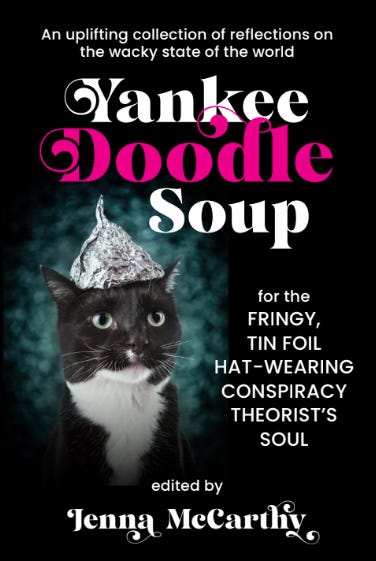FDA Insists No Need to Worry About Toxic Food Supply in America
"It's always been awful, so why the sudden outrage?"
WASHINGTON, D.C. — In a move that has left America’s top food scientists utterly baffled, U.S. Health and Human Services Secretary Robert F. Kennedy Jr. announced plans to eliminate a decades-old FDA program that allows the food industry to regulate itself, because, as it turns out, trusting billion-dollar corporations to be their own watchdogs is as realistic as asking your chihuahua to file his own tax return.
The program, known as GRAS (“Generally Recognized As Safe”), was originally meant to cover common ingredients like salt and vinegar but somehow expanded to include unpronounceable lab-born substances that may or may not double as industrial floor cleaners or be used to make flip-flops and glue. Thanks to this regulatory blind spot, food companies have been able to introduce new additives with zero oversight—a system that insiders describe as “basically Mad Libs for food safety monitoring.”
“For too long, we’ve let the very people making money off these chemicals decide if they’re safe,” Kennedy said in a statement. “And shockingly, they’ve decided every single time that they are. What are the odds?”
Kennedy’s announcement has sent shockwaves through the processed food industry, where executives are now lobbying congress to redefine “natural” as “anything that exists in the universe” and launching PR campaigns promoting the idea that chemical-free food is Islamophobic.
“GRAS was a loophole,” admitted an FDA spokesperson who formerly served as CEO of The Coca-Cola Company. “But it was a legal loophole. And just last year we banned brominated vegetable oil! Fifty-four years after the UK first did and a few decades after India, the EU, and Japan, but still. Your Fanta is never going to taste the same, by the way.”
Defenders of GRAS argue that corporations should be trusted to act in consumers’ best interests. These same individuals believe oil companies would never pollute, banks would never engage in fraud, and the weight loss industry would never try to sell you a sugar pill that promises to melt away fat overnight. “If we start questioning Big Food now, what’s next?” asked an exasperated lobbyist. “Making pharmaceutical companies prove their drugs won’t kill you? Please.”
Kennedy has already faced fierce opposition from food industry leaders, who—despite their unwavering commitment to transparency—immediately held a closed-door meeting to discuss “solutions.” The gathering included top executives from Kellogg’s, Kraft Heinz, General Mills, Smucker’s, and PepsiCo, who reportedly reassured the Secretary that, yes, their own products are absolutely safe and that, no, they definitely haven’t been using America’s food supply as a long-term science experiment.
In an effort to put the public at ease, food companies have already started rolling out new, totally-not-suspicious marketing campaigns. Tyson Foods—the culinary parent-company genius behind Ball Park Nacho Cheese Franks, which contain sodium hexametaphosphate, hydrogenated cottonseed oil, potassium lactate, sodium diacetate, artificial color, and cellulose powder (to prevent caking!)—has unveiled a series of ads featuring actors in lab coats cheerfully explaining that “if you can’t pronounce it, you don’t need to worry about it,” and candy giant Nestlé has introduced a new slogan: “Safe is subjective; chocolate isn’t.”
Meanwhile, manufacturers critics are worried that stripping away the GRAS designation could lead to dangerous side effects, such as consumers actually knowing what’s in their food and buying less of their highly profitable chemical-laden frankenfoods. Some experts fear that increased regulation might also drive up costs. “Forcing companies to actually test their products before dumping them into the food supply is an outrageous and unrealistic burden,” lamented an industry spokesperson under the condition of anonymity. “You think it’s easy finding new ways to cram even more addictive chemicals into breakfast cereal?”
One food scientist attempted to defend the current system, saying, “Sure, some of the additives we use all day every day have been linked to minor issues like increased cancer risk and neurological damage, but let’s not forget the positives! We can currently produce refreshments that double as glow sticks. If you’ve never been to a rave, you may not understand just how handy that is.”
“I’ve been part of a team that literally just discovered a brand-new way to extend the shelf life of Twinkies to slightly past their current expiration date of never,” added the President of the Snack Food Association of America. “That’s four years of my life I’ll never get back.”
While Kennedy’s plan could mark a major shift in food safety, skeptics doubt whether the FDA will get the funding needed to enforce real change. “We’d love to help,” said one agency official, “but we’re already understaffed, underfunded, and I don’t know if you know this, but they’re forcing us all to come back to work and there is literally nowhere to park. It’s a nightmare.”
At press time, American consumers were responding to the news by posting distraught videos on social media, stockpiling Doritos, and googling “how to build a junk food bunker”.
*LMK why you voted the way you did in the comments.








I lived in Ireland from 2015-2018 and traveled all over Europe while I was there. They don't have all the crap in their food we have, even for the same American made products. So they can easily take out the GRAS bullshit ingredients since they already do in other countries. They just don't want to.
A local market has a section marked "health food".
My question is what about all the other food for sale?? 🤔